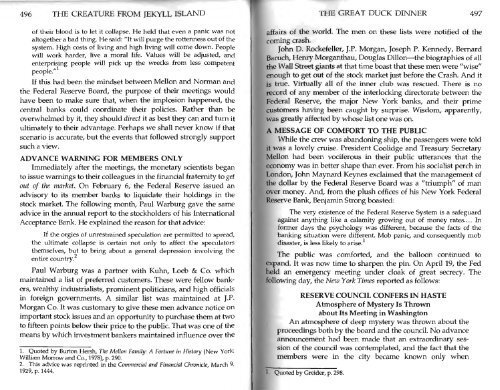Create successful ePaper yourself
Turn your PDF publications into a flip-book with our unique Google optimized e-Paper software.
496 THE CREATURE FROM JEKYLL ISLAND<br />
THE GREAT DUCK DINNER 497<br />
of their blood is<br />
to let it collapse. He held that even a panic was not<br />
altogether a bad thing. He said: "It will purge the rottenness out of the<br />
system. High costs of living and high living will come down. People<br />
will work harder, live a moral life. Values will be adjusted, and<br />
enterprising people will pick up the wrecks from less competent<br />
people."<br />
If this had been the mindset between Mellon and Norman and<br />
the Federal Reserve Board, the purpose of their meetings would<br />
have been to make sure that, when the implosion happened, the<br />
central banks could coordinate their policies. Rather than be<br />
overwhelmed by it, they should direct it as best they can and turn it<br />
ultimately to their advantage. Perhaps we shall never know if that<br />
scenario is accurate, but the events that followed strongly support<br />
such a view.<br />
ADVANCE WARNING FOR MEMBERS ONLY<br />
Immediately after the meetings, the monetary scientists began<br />
to issue warnings to their colleagues in the financial fraternity to get<br />
out of the market. On February 6, the Federal Reserve issued an<br />
advisory to its<br />
member banks to liquidate their holdings in the<br />
stock market. The following month, Paul Warburg gave the same<br />
advice in the annual report to the stockholders of his International<br />
Acceptance Bank. He explained the reason for that advice:<br />
If the orgies of unrestrained speculation are permitted to spread,<br />
the ultimate collapse is certain not only to affect the speculators<br />
themselves, but to bring about a general depression involving the<br />
entire country.<br />
Paul Warburg was a partner with Kuhn, Loeb & Co. which<br />
maintained a list of preferred customers. These were fellow bankers,<br />
wealthy industrialists, prominent politicians, and high officials<br />
in foreign governments. A similar list was maintained at J.P.<br />
Morgan Co. It was customary to give these men advance notice on<br />
important stock issues and an opportunity to purchase them at two<br />
to fifteen points below their price to the public. That was one of the<br />
means by which investment bankers maintained influence over the<br />
1. Quoted by Burton Hersh, The Melton Family: A Fortune in History (New York:<br />
William Morrow and Co., 1978), p. 290.<br />
2. This advice was reprinted in the Commercial ai\d Financial Chronicle, March 9,<br />
1929, p. 1444.<br />
affairs of the world. The men on these lists<br />
were notified of the<br />
coming crash.<br />
John D. Rockefeller, J.P. Morgan, Joseph P. Kennedy, Bernard<br />
Baruch, Henry Morganthau, Douglas Dillon—the biographies of all<br />
the Wall Street giants at that time boast that these men were "wise"<br />
enough to get out of the stock market just before the Crash. And it<br />
is true. Virtually all of the inner club was rescued. There is no<br />
record of any member of the interlocking directorate between the<br />
Federal Reserve, the major New York banks, and their prime<br />
customers having been caught by surprise. Wisdom, apparently,<br />
was greatly affected by whose list one was on.<br />
A MESSAGE OF COMFORT TO THE PUBLIC<br />
it<br />
While the crew was abandoning ship, the passengers were told<br />
was a lovely cruise. President Coolidge and Treasury Secretary<br />
Mellon had been vociferous in their public utterances that the<br />
economy was in better shape than ever. From his socialist perch in<br />
London, John Maynard Keynes exclaimed that the management of<br />
the dollar by the Federal Reserve Board was a "triumph" of man<br />
over money. And, from the plush offices of his New York Federal<br />
Reserve Bank, Benjamin Strong boasted:<br />
The very existence of the Federal Reserve System is a safeguard<br />
against anything like a calamity growing out of money rates.... In<br />
former days the psychology was different, because the facts of the<br />
banking situation were different. Mob panic, and consequently mob<br />
disaster, is less likely to arise.<br />
The public was comforted, and the balloon continued to<br />
expand. It was now time to sharpen the pin. On April 19, the Fed<br />
held an emergency meeting under cloak of great secrecy. The<br />
following day, the New York Times reported as follows:<br />
RESERVE COUNCIL CONFERS IN HASTE<br />
Atmosphere of Mystery Is Thrown<br />
about Its Meeting in Washington<br />
An atmosphere of deep mystery was thrown about the<br />
proceedings both by the board and the council. No advance<br />
announcement had been made that an extraordinary session<br />
of the council was contemplated, and the fact that the<br />
members were in the city became known only when<br />
I. Quoted by Greider, p. 298.


